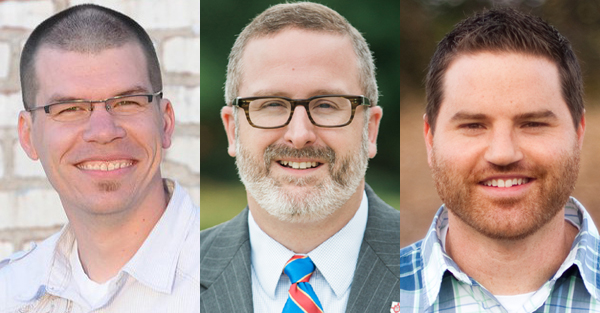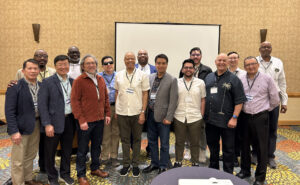
NASHVILLE (BP) — Controversy surrounding ethicist Russell Moore’s past comments on President-elect Donald Trump has led three Tennessee Baptists — all under the age of 40 — to issue an open letter calling “the [conservative] resurgence generation and their protégés” to “be the statesmen we need them to be in this season of denominational tension.”
 Jonathan Akin, Nathan Finn and Micah Fries wrote in a Dec. 21 open letter provided to Baptist Press, “Now isn’t the time for acrimonious debates over secondary and tertiary doctrinal matters,” such as the extent of the atonement, church polity, methodology and the appropriate means of cultural engagement.
Jonathan Akin, Nathan Finn and Micah Fries wrote in a Dec. 21 open letter provided to Baptist Press, “Now isn’t the time for acrimonious debates over secondary and tertiary doctrinal matters,” such as the extent of the atonement, church polity, methodology and the appropriate means of cultural engagement.
They directed their comments especially toward Southern Baptists who led the conservative resurgence of the 1980s and 1990s as well as those mentored by that generation, noting, “Our real enemy is the Prince of Darkness.” The resurgence attempted to make biblical inerrancy a bedrock commitment of Southern Baptist Convention entities.
“Our hope is for men in key leadership roles in Southern Baptist life — elected officers, denominational leaders and pastors alike — to step forward and lead us in building a renewed consensus within the SBC,” Akin, Finn and Fries wrote.
Akin is pastor of Fairview Church in Lebanon, Tenn.; Finn is dean of the School of Theology and Missions at Union University in Jackson, Tenn.; and Fries is pastor of Brainerd Baptist Church in Chattanooga, Tenn.
The open letter was released two days after The Wall Street Journal published an article on Moore, president of the Ethics & Religious Liberty Commission, with the headline “Baptist figure faces backlash over his criticism of Donald Trump.”
The Dec. 19 Journal report cited critiques of Moore by four Southern Baptists of the generations referenced by the open letter and one by a pastor of the same generation as Akin, Finn and Fries. The Journal suggested some churches could withhold gifts to the Southern Baptist Convention’s Cooperative Program — due, at least in part, to Moore’s statements.
The Cooperative Program is Southern Baptists’ unified channel of supporting missions and ministries in America and across the globe, including the ERLC.
Also on Dec. 19, Moore published a blog post apologizing for any miscommunication on his part and clarifying that he never intended to criticize all evangelical supporters of Trump.
“There’s a massive difference,” Moore wrote, “between someone who enthusiastically excused immorality and someone who felt conflicted, weighed the options based on biblical convictions, and voted their conscience.”
Among Moore’s comments that have drawn critique, he wrote in a Sept. 2015 New York Times op-ed that “evangelicals and other social conservatives” must “repudiate everything they believe” to support Trump.
Akin, Finn and Fries acknowledged that “in our age of instant information and social media, our tensions have been put on display — and perhaps exaggerated.” Still, they argued “the recent back-and-forth over presidential politics represents the latest in a string of squabbles that have exposed fissures that threaten our Great Commission cooperation.”
Southern Baptists appear “as divided as we have been at any point in a quarter century,” Akin, Finn and Fries asserted. “It’s a time of tension in Southern Baptist life. As younger Southern Baptist ministers who haven’t yet reached the age of forty, our concern — shared by many of our generational peers — is that these tensions could lead to division.”
The letter noted that Akin, Finn and Fries are “heirs of the conservative resurgence” and “deeply respect” the generations of leaders to whom the letter is directed.
While Southern Baptists may differ on secondary matters, according to the open letter, the Baptist Faith and Message remains a sufficient basis for cooperation within the SBC.
“To be certain, we are at war. But our enemy isn’t fellow Southern Baptists with whom we differ in some ways (and agree on far more!),” the letter stated. “Our real enemy is the Prince of Darkness to whom the lost are enslaved, who delights in the suffering of the oppressed, and who revels in the persecution of the righteous.
“And our weapon isn’t absolute theological or methodological uniformity, or secular political power, or even maintaining our place as the largest Protestant denomination in America. Our weapon in this spiritual war is the good news of the saving work of Jesus Christ,” according to the letter.
At the time the open letter was published, an #IStandWithMoore hashtag on Twitter had been circulated on social media. Moore tweeted Dec. 19, apparently in response to the hashtag, “Appreciate all the kind words, y’all. If we’re going to hashtag, let’s #standwithSBC together. Our gospel mission is too important.”
The text of the open letter by Akin, Finn and Fries follows.
–30–
A Plea for Denominational Statesmanship in a Time of Tension
Dec. 21, 2016
Recent events have highlighted some of the differing opinions in Southern Baptist life, specifically in the area of political engagement. Earlier this week, Russell Moore of the Ethics and Religious Liberty Commission issued an apology and a clarification related to his sometimes-controversial comments about the recent presidential election. The same day, The Wall Street Journal published an article that recounts backlash against Moore within the SBC, interviewing several pastors, including a former convention president and a former SBC Executive Committee chairman. Social media subsequently erupted with various Baptists drawing lines and taking sides.
The recent back-and-forth over presidential politics represents the latest in a string of squabbles that have exposed fissures that threaten our Great Commission cooperation. By all appearances, Southern Baptists are as divided as we have been at any point in a quarter century. It’s a time of tension in Southern Baptist life. As younger Southern Baptist ministers who haven’t yet reached the age of forty, our concern — shared by many of our generational peers — is that these tensions could lead to division.
From our inception in 1845, Southern Baptists have always been a diverse people. We champion liberty of conscience under the Lordship of Jesus Christ. We value the principle of local church autonomy. We have no denominational creed that all churches must affirm in order to be a part of our convention. Yet, despite our differences, and despite our failures as sinners, the Lord has richly blessed us these past 170+ years. We’re thankful to be part of the Southern Baptist family.
At present, Southern Baptists are experiencing tensions over theological differences, especially when it comes to doctrines such as predestination and the atonement. We’re experiencing tensions over polity, especially questions of elders, pastoral authority, and the nature of congregationalism. We’re experiencing tensions over methodology, especially when it comes to music style, dress for pastors, programming, and public invitations. We’re experiencing tensions over strategy, including church planting and missionary funding. We’re experiencing tension over cultural engagement, especially the relationship between faith and elective politics. Some of these tensions tend to be generational. Others are more regional. All reflect honest differences among sincere Christians whom we trust want to honor the Lord Jesus Christ, see our churches become healthier, reach the lost, and be salt and light in our culture.
Unfortunately, in our age of instant information and social media, our tensions have been put on display — and perhaps exaggerated — before the watching world. We fear that the public nature of our tensions has harmed friendships, lessened trust in denominational leadership (both elected and appointed), exacerbated generational and regional differences, and most important, negatively impacted our public witness and threatened our cooperation in proclaiming the gospel. We don’t believe this honors our Lord.
To be certain, we are at war. But our enemy isn’t fellow Southern Baptists with whom we differ in some ways (and agree on far more!). Our real enemy is the Prince of Darkness to whom the lost are enslaved, who delights in the suffering of the oppressed, and who revels in the persecution of the righteous. And our weapon isn’t absolute theological or methodological uniformity, or secular political power, or even maintaining our place as the largest Protestant denomination in America. Our weapon in this spiritual war is the good news of the saving work of Jesus Christ. As we’ve sung since childhood, “our hope is built on nothing less than Jesus’ blood and righteousness.”
The spiritually lost are all around us in the rural crossroads, small towns, suburbs, and great cities of our nation. Two billion people, most (but not all) in faraway lands, have never heard the gospel. Millions of people all over the world are oppressed because of the color of their skin, or their poverty, or their gender, or their age, or their faith. Religious liberty is threatened in many nations, and increasingly in America. The persecution of believers the world over is at an all-time historical high. Simply put, the stakes are too high and life is too short for our tensions to divide us and distract us.
We’re heirs of the conservative resurgence that effected a theological course correction in our beloved convention. We share the conservative, orthodox, Baptist convictions of those who’ve gone before us. We’re grateful for their courage to stem the tide of theological declension and reassert the healthy relationship between sound doctrine, genuine devotion, and kingdom mission. The resurgence generation and their protégés include leaders we deeply respect, many of whom are still active as pastors, evangelists, and denominational servants. It’s to them we make this plea.
Now isn’t the time for rivalries. Now isn’t the time for grudges. Now isn’t the time for acrimonious debates over secondary and tertiary doctrinal matters. Now isn’t the time for division. We call upon our leaders once again to be the statesmen we need them to be in this season of denominational tension. Our hope is for men in key leadership roles in Southern Baptist life — elected officers, denominational leaders and pastors alike — to step forward and lead us in building a renewed consensus within the SBC.
Southern Baptists must come together for such a time as this. Despite our differences, we agree on so much. The Baptist Faith and Message 2000 commends a high view of Scripture’s inspiration, authority, and truthfulness, a clear summary of the gospel, a robustly Baptist view of the church, a burden for evangelism and missions, a commitment to Christ-centered cultural engagement, and a biblical vision of gender and the family. We need statesmen who will rally us around these priorities!
Now is the time for humble spiritual leadership in a time of tension. Who will rise up and be remembered in the future as this generation’s George W. Truett and J.B. Gambrell? Who will be our E.Y. Mullins and our L.R. Scarborough? Who will be our Hershel Hobbs and our W.A. Criswell? Who will be our Adrian Rogers? Our prayer is that today’s faithful statesmen will again bring all Southern Baptists together for the glory of God and the sake of our shared mission.
Jonathan Akin
Nathan A. Finn
Micah Fries















